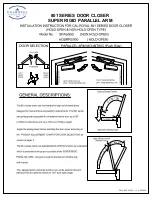
38
GUIDE TO MIG/MAG WELDING
Before starting any welding activity ensure that you have suitable eye protection and
protective clothing. Also take the necessary steps to protect any persons within the welding
area.
MIG process description
The MIG process was first patented for the welding of aluminium in 1949 in the USA.
The process uses the heat that is generated by an electric arc formed
between a bare consumable wire electrode and the work piece.
This arc is shielded by a gas to prevent oxidation of the weld.
In the MIG process an inert shielding gas is used to protect the
electrode and weld pool from contamination and enhance
the arc. Originally this gas was helium.
In the early
1950’
s the process became popular in the UK
for welding aluminium using argon as the shielding gas.
Development in the use of different gases resulted in
the MAG process. This is where other gases were used,
for example, carbon dioxide and sometimes users
refer to this process as CO² welding. Gases such as oxygen and carbon dioxide were added and are active
constituents to the inert gas to improve the welding performance. Although the MAG process is in
common use today it is still referred to as MIG welding although technically this is not correct.
This process began to prove itself as an alternative to stick electrode (MMA) and TIG (GTAW) offering
high productivity and deposition rates.
The process also helps reduce any weld defects from the increased stop/starts used in MMA. However,
the welder must have a good knowledge of the system set up and maintenance to achieve satisfactory
welds.
The electrode MIG gun is noVE and the work return is normally –VE. However, certain
consumable wires sometimes require what is called reverse polarity i.e. Electrode –VE or work +VE.
Typically these types of wire are cored wires used in hard facing or high deposition and gasless
applications.
Typical welding ranges
Wire Diameter
Spray Transfer
DIP Transfer
(mm)
Current (A)
Voltage (V)
Current (A)
Voltage (V)
0.6
30 ~ 80
15 ~ 18
n/a
n/a
0.8
45 ~ 180
16 ~ 21
150 ~ 250
25 ~ 33
1.0
70 ~ 180
17 ~ 22
230 ~ 300
26 ~ 35
1.2
60 ~ 200
17 ~ 22
250 ~ 400
27 ~ 35
Содержание EVO 2.0 EM-160C
Страница 1: ...1...
Страница 75: ...75 UKCA Declaration of Conformity...
Страница 76: ...76 EC DECLARATION OF CONFORMITY...
Страница 78: ...78 SCHEMATIC...
Страница 82: ...82...
















































